Are you curious about the benefits of deep cycle lithium marine batteries and how to choose the right one for your boat? In this article, we will explore the concept of marine lithium batteries and delve into their advantages. Additionally, we will guide you in selecting the ideal Deep Cycle Lithium Marine Batteries and address frequently asked questions in the field.
Part 1. What is a marine lithium battery?
A marine lithium battery is a type of battery specially built for boats and other watercraft. Unlike traditional batteries, marine lithium batteries use advanced lithium-ion technology. These smaller and lighter batteries make them perfect for boats where space and weight are crucial. They’re also known for their ability to hold more energy in a smaller size, meaning boats can carry fewer batteries without sacrificing power.
Marine lithium batteries can be charged and discharged many times without losing performance, making them reliable for long trips on the water. They’re also more durable and have a longer lifespan than traditional batteries, which is essential for marine environments where reliability is critical.
Part 2. Features of lithium marine batteries
Lithium-ion marine batteries offer superior efficiency, reduced weight, and a remarkable lifespan of up to 10 times longer than lead-acid batteries. These combined benefits make them an exceptional choice for boating applications.
Lightweight
Considering the weight limits of boats, minimizing the weight carried onboard holds significant importance. Lithium batteries weigh approximately half as much as lead-acid batteries with the same capacity, substantially reducing overall weight.
High charge/discharge cycles
Deep-cycle lead-acid marine batteries typically provide a lifespan of 500-1,000 charge-discharge cycles. In contrast, lithium marine batteries can endure 3,000-5,000 cycles, greatly extending their operational longevity.
Furthermore, the maintenance requirements of lead-acid batteries directly impact their lifespan. In contrast, lithium-ion batteries demand minimal maintenance while ensuring optimal performance and lifespan.
Increased Power Storage
Discharging a lead-acid battery below 50% capacity can cause damage and shorten its life. Conversely, most lithium battery manufacturers specify an 80% depth of discharge, and some even allow for complete discharge without harm. The enhanced power storage capacity of lithium batteries is genuinely remarkable.
With nearly double the capacity compared to lead-acid batteries, you may only require half the number of batteries. This reduction in battery quantity, coupled with the fact that each lithium battery weighs only half as much as a lead-acid battery, results in an impressive four-fold decrease in weight.
Long-Term Cost Efficiency
Although the upfront cost of lithium marine batteries surpasses that of lead-acid batteries, their prolonged lifespan more than compensates for the initial investment.
Lithium batteries are typically last at least five times longer than their lead-acid counterparts. This extended lifespan, combined with their higher efficiency, makes lithium-ion marine batteries more cost-effective in the long run. Moreover, considering the potential reduction in the batteries needed, the cost savings become even more significant.
Part 3. What about Ufine’s lithium battery for boats?
Ufine Battery is a professional lithium-ion battery manufacturer with highly customizable, responsive customer service, servicing small and medium-sized customers, fast shipping, and a one-year warranty. We are dedicated to customizing the batteries you need for your equipment; browse 12V LiFePO4 batteries to find your marine lithium battery energy solution.
Cell: 140210230
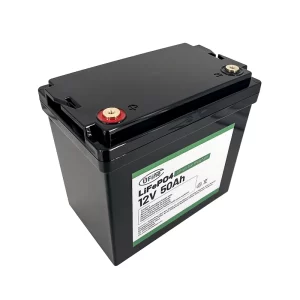
Weight: appr. 4kg
Capacity: 50Ah
Nominal Voltage: 12.8V
Energy: 640Wh
Internal Resistance: less than 15mΩ
Cell: 185215340
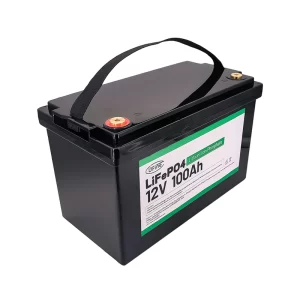
Weight: appr. 8kg
Capacity: 100Ah
Nominal Voltage: 12.8V
Energy: 1280Wh
Internal Resistance: less than 15mΩ
Cell: 240220525
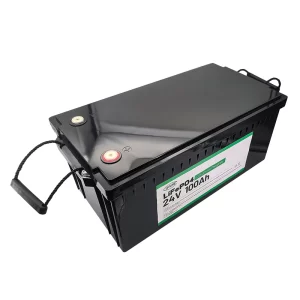
Weight: appr.16kg
Capacity: 200Ah
Nominal Voltage: 12.8V
Energy: 2560Wh
Internal Resistance: less than 15mΩ
Cell: 270220525
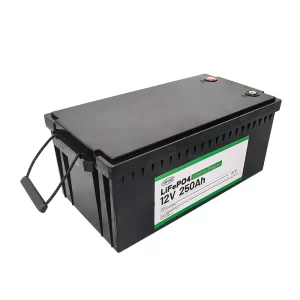
Weight: appr. 20kg
Capacity: 250Ah
Nominal Voltage: 12.8V
Energy: 3200Wh
Internal Resistance: less than 15mΩ
Part 4. How do you choose deep-cycle lithium marine batteries?
Capacity
Determine the capacity required based on your boat’s power demands. Calculate the total power consumption of all onboard electronics and accessories to select a battery with sufficient capacity to meet your needs.
Voltage
Check the voltage requirements of your boat’s electrical system to ensure compatibility with the lithium battery. Most marine applications typically use 12V or 24V systems.
Physical Size and Weight
Consider the dimensions and weight of the battery to ensure it fits within the available space on your boat and does not exceed weight limits.
Cycle Life
Look for batteries with a high cycle life rating, indicating the number of charge-discharge cycles the battery can withstand without significant performance degradation. Opt for batteries with a longer cycle life for extended durability.
Charging Compatibility
Ensure the battery is compatible with your boat’s charging system. Check the charging voltage and current requirements to avoid compatibility issues.
Operating Temperature Range
Consider the temperature conditions in which the battery will operate. Choose a battery with a wide operating temperature range to ensure reliable performance in various environmental conditions.
Warranty
Check the manufacturer’s warranty terms to protect against defects and ensure peace of mind. Look for batteries with a comprehensive warranty that covers both performance and durability.
Part 5. FAQs
-
Are lithium marine batteries worth it?
Lithium marine batteries are worth it due to their lightweight design, longer lifespan, faster charging capabilities, and higher energy density than traditional lead-acid batteries. -
How long do lithium marine batteries last?
Lithium marine batteries typically last longer than lead-acid batteries, with a lifespan of up to 10 years or more, depending on usage and maintenance. -
What is the problem with lithium batteries in boats?
One potential problem with lithium batteries in boats is the risk of thermal runaway, which can occur if the battery is damaged or improperly charged. However, this risk can be mitigated through proper installation, maintenance, and protective features such as battery management systems. -
Do lithium marine batteries need a special charger?
While lithium marine batteries can be charged with standard battery chargers, it is recommended to use a charger specifically designed for lithium batteries to ensure safe and efficient charging. These chargers typically have built-in safety features and charging profiles optimized for lithium chemistry.
Related Tags:
More Articles
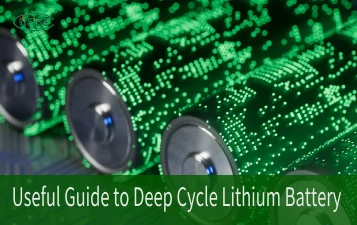
Overview of Deep Cycle Lithium Battery
In this article, we explore the life, voltage, capacity, and charging considerations of deep cycle lithium batteries.
How Long do Lithium Batteries Last?
How long do lithium batteries last? we will explore the factors that influence the lifespan of lithium batteries and provide insights into their longevity.
How to Choose the Best LiFePO4 Battery?
Choose LiFePO4 batteries for superior performance, safety, and versatility in EVs, UPS, and backup power. This guide helps you make informed decisions.
Get 12v Lithium Car Battery As a Power Source for the Ride
Make the right choice for your vehicle's battery needs by installing a 12 volt lithium car battery. You will enjoy maintenance-free longevity with this change.
Everything About A Small Lithium Ion Battery
Discover the features, uses & future potential of a small lithium ion battery. A compact and tiny powerhouse ideal for smartphones, wearables, drones & more.





